- Home
- Peter Grainger
A Private Investigation
A Private Investigation Read online
A PRIVATE INVESTIGATION
A DC SMITH INVESTIGATION
PETER GRAINGER
Chapter One
Jo Evison picked up the bone china cup and took a sip of the tea; Sunday best, Smith had said. There was a whole matching service in the cabinet in the dining room – wafer thin porcelain, almost translucent and decorated with pink roses; it was wildly out of fashion but she guessed that you wouldn’t have got much change out of a hundred pounds even when it was first bought many years ago. Maybe it had been a wedding present for Smith and Sheila.
She said, ‘I understand.’
‘Well, if anyone can… But saying that, I know plenty of coppers who still wouldn’t. Who still don’t.’
‘Plenty of coppers never deal with it, though. The public imagines that every officer is confronting the worst of it on a weekly basis. That’s television, of course. It’s true that if you’re a police officer for any length of time, you’ll see things you wish you hadn’t, but the real horrors? Well, it’s not one in a hundred of us, is it?’
‘Us?’
Smith looked across the table at her with the quizzical half-smile that she was beginning to recognise as one of his regular expressions.
‘OK. You!’
‘It’s alright. It’s just the old cliché – you can take the girl out of the town, or whatever, but you can’t take the town out of the girl. You can leave the police force but it will never leave you.’
She said, ‘And that’s something you need to bear in mind. Three weeks to go!’
Three weeks to Friday the 23rd of December, and that would be it. The idea was still so strange he didn’t know how to feel about it yet, but when Jo looked more closely to see what effect her words might have had, she would have seen little more than the many persons of interest who had sat across the table from him in the interview rooms of Kings Lake Central police station over the past thirty years. With Smith one saw more or less only what he wanted you to see. But given time, Jo thought…
He’d been thinking about what she said, about understanding.
He said, ‘I assumed – forgive me and don’t tell Waters – that you left the Met for pastures new. To take up academic work again, and to start writing these books.’
He nodded down at the printed sheets on the table, and the A4 pad that had a page of her scribbled notes, always done with the same brand of HB pencil - Genius by Caran D’ache, made in Switzerland. Smith had never heard of them until he met her, and he’d been meaning to look them up ever since.
‘And that’s partly true. But I was lucky to have those alternatives.’
‘So, what was the other part?’
‘Oh…’
But she could not avoid giving an answer, not and be fair to him, because they were reaching the point in her research at which she would ask him to talk about the details of the Andretti killings. She could not ask him to do that and still be coy about her own reasons for leaving the Metropolitan Police.
She said, ‘Because of my Psychology background they were directing me into profiling, which was exactly what I’d wanted when I joined. Profiling was still a new thing then, a bit of a fad after it played a part in the conviction of Robert Napper. It all happened very quickly for me. Suddenly I was seeing and hearing about things that I’d never imagined – if I had imagined them, to be honest, I’d want to be on the other side of the desk and getting some treatment.’
The teapot was on the table between them, sitting on its own little ceramic stand. Smith lifted off the cosy, tipped a little milk into his cup from a tiny white jug and raised an eyebrow at her; Jo shook her head, watching him refill his own cup with the pale amber liquid.
She continued, ‘So, anyway, I could tough it out. I never had to walk away from a crime scene, and I had a couple of horrors. Have you seen that, big blokes who just had to walk away from it, literally?’
‘Yes. And if they’ve got any sense they never go back. It’s not for everyone, and there’s no shame in admitting that.’
He was leaving it to her, letting her go at her own pace and say as much or as little as she wanted, not probing to find out why she had, in the end, turned away. So then you felt in control, not threatened, which made you want to tell him anyway because you have a deep need to share these things, if only you can find the right person. And in this business, there aren’t many of them.
She said, ‘It’s odd but for me it wasn’t the crime scene stuff. I could detach myself when it was actually in front of me. It was the aftermath, especially the photographs. Sitting at a desk, your desk, staring at them, poring over them for something that might lead to a conviction eighteen months later. Certain photographs…’
‘You can still see them.’
‘Yes.’
‘It’s alright – I don’t need the details.’
But she did, that was the worst thing, she needed the details from him, and she wished this conversation had never begun. After a pause, she said, ‘I went to a lecture once by Paul Britton. Have you heard of him?’
‘Yes, I know who he is.’
‘He talked about it. I can’t remember the exact words but he said that it changes who you are, every time you encounter the worst things that people can do. You have to be aware of that, in yourself. You have to decide at some point how much you are prepared to take. And in one of his books he wrote that the very nature of the work erodes you.’
Smith considered it before saying, ‘Good choice of word.’
‘I’d go home, go to bed and everything had been normal but then, whether or not I’d closed my eyes, I’d see the photographs again – just certain ones over and over. I’d think, is that what he saw? How long did he spend staring at his handiwork? Did he even arrange things like that because he wanted us to take the photographs? Are we his audience? Are we a part of it?’
‘And then, if you do happen to fall asleep, you’ll probably have nightmares about it.’
She looked at him and thought, he always seems calm – placid, even – though I’ve never seen him at work, managing a team of detectives. But I’ll bet he isn’t very different even then. He doesn’t look like a man who has bad dreams. It doesn’t always show, though, not on the outside. The erosion can take place unseen. It can hollow you out from the inside.
Smith said, ‘There are a few like that. The ones for whom it’s a game, and the pawns they sacrifice just happen to be real people. Those are the ones they call primary psychopaths, aren’t they, miss?’
It was easy to see him as the epitome of the pragmatic policeman, and he wasn’t above mocking her academic background as those officers invariably do, though from him it was always good-natured and friendly. But she knew now that he was more than that. She knew about the bright grammar-school boy, meant for university until family circumstances intervened; she knew a little about his time in the Army, the dangerous undercover work in Belfast. She knew that he had himself been offered a post in an elite squad in the Met until a case back on his own turf demanded his return – the Andretti case, the Ice-cream Killer, the very one that she was now beginning to interview him about.
‘Yes, correct, go to the top of the class. But they’re very rare. Most atrocities arise out of upbringings and relationships that have gone wrong, hard as that might seem to believe.’
Smith drank a little more tea and looked past her out into the garden. There was weak winter sunshine and last night’s sharp frost had retreated into the furthest, darkest corners, waiting for nightfall once more. It was a funny sort of conversation for a Sunday afternoon.
He said, ‘Tell me about the primary sort. Just one sentence if you can.’
‘They don’t empathise, they don’t share in other’s e
motions, they don’t feel guilt or remorse. The rest of us would hardly recognise the world if we saw it through their eyes.’
And by now she also knew how particular he could be about language. She wondered whether he might say ‘That’s two’, and she waited. But he continued to stare out through the French doors, eyes focused on something far away from the darkening garden.
Her fault, of course. Her fault. She had made him think about Marco Andretti again.
She was catching an early train back to London, so at ten o’clock Jo had left him in the lounge and gone up to her room – her room now, to which she had taken her bag without being prompted on Saturday morning. Then they had gone into town and had lunch at Sandrine’s, and she had guessed correctly what he would order. It’s about being known, isn’t it, about letting yourself be known.
No peck on the cheek before she went up to the bedroom – it was consciously avoided by both of them. The unspoken agreement made months ago would hold because they were grown-ups, and because to break it would fatally compromise the writing of that book. The book mattered to her, and it was beginning to matter to Smith, though possibly for somewhat different reasons.
When he went upstairs a few minutes after her, he turned on his bedside lamp and then crossed the landing to his office. He stood in front of the shelf of Alwych notebooks but there was no need to check that it was there, the one which he had been using thirteen years ago. It was the only one that had ever fallen apart and at the time he had repaired it with a couple of strips of sellotape along the spine. He could have closed his eyes and still picked it out of the row of identical notebooks.
In his hand, it felt like the rest of them. He ran his left thumb across the pages as he bent the flexible cover, flicking them like the edge of a pack of cards. Then he opened the book at a single page and thought that his handwriting hadn’t changed much over the years. The page was near the front of the notebook, before Andretti. He thought and then closed the book. It was all in there should he need it but he didn’t think he would.
In bed, he read for a few minutes – some essays by a young right-wing thinker, polemics condemning the rising tide of identity politics and what the writer had labelled ‘equalitarianism’. It was funny, clever writing, and exactly the sort of thing that Sheila and he might have argued over for days on end – she was always a little to the left of him, whatever the issue. Argued but never fallen out, of course.
Smith closed the book but didn’t turn out the light straight away. He had been in a bookshop and the title of those essays had caught his eye; he’d thought, I need to know something about that. Why? Because for a long time now he had had the sense that there is something new in the air, that a change is coming. Perhaps not a change for the better – change isn’t always for the better. Some of the things that had been taken for granted throughout his lifetime – since he was born in the 1950s when rationing was still in operation after the Second World War – were now up for debate. Taking some responsibility as well as demanding one’s rights? Decency? Duty? Democracy itself? They all seemed to be in question, and he didn’t like the sound of some of the answers he was hearing.
You’re getting old, Smith, you’re turning into Victor Meldrew! He smiled at himself and turned out the light, ready for them, his own display of unforgettable images pinned up in the gallery of darkness inside his head – ready for them because he knew perfectly well how his own mind worked, had known since Jo mentioned those “certain photographs” that some of them would trouble him tonight.
More sadness than fear or dread, now – sadness at the picture of Juliet Richardson, the one in which she had her arms around her two younger sisters, all of them looking into the lens and laughing. The police had never used it, had chosen a school photograph instead, but that family image had lain in the file for months and it was the one that still haunted Smith. Sadness at the image of Annabelle Lewis, the second girl, seventeen years of age, blonde, blue-eyed, arranged on the sand like a slender, naked fallen angel, a mile west of Barnham – that photograph had been taken in the early light of an August dawn before anyone had touched her, and it had a surreal, unearthly quality.
And not only photographs for Smith, as he lay there in the night. Sadness at the laughing face of a young Irishman walking towards him, raising the gun, ready to fire again…
The bedroom was cold. He wondered whether Jo was feeling it, and whether he ought to have left the heating on low overnight. Waiting for the images to fade, Smith thought about what might lie ahead now. It wasn’t all dark. Remember those dinghies swinging about as the tide flooded into Barnham Staithe? He would buy one of those in the spring. Remember Malcolm Partington RN, lieutenant commander retd., saying how they could use an old copper in the coastguard at Sheringham and meaning it? There would be a cap and a badge and everything! Remember Jo saying that she might have the first draft done by early summer? The first draft would be enough, wouldn’t it?
Chapter Two
Another Monday morning, another day of office work and administration. They seemed to have been doing nothing else for weeks. Now the CPS had called for the complete evidence files in the case of the murder of Bernard Sokoloff, and they wanted them yesterday. What was the hurry? Peter Vince and John Fisher had both been remanded in custody; Mark Williams had shown no signs of running for the hills of mid-Wales.
Detective Constable Serena Butler glanced around to see where the DI was this morning – she still hadn’t got used to him having a desk in the main office as well as one in his own room three doors further down. Terek was alright but you couldn’t relax like you could when Alison Reeve had been DC’s line manager. It wasn’t like it used to be. If Terek saw you chatting across the desks, it wouldn’t be long before he came over to see what he was missing. And there was talk of everything being reorganised, everything and everyone in the new year. Not for the first time, she wondered whether they were waiting until DC had left the building.
She’d been going to talk to Chris for something else to do but now he was on the phone – like herself he was making plans and she was curious as to how much progress he had made. Plenty, probably, with all his bits of paper and certificates. So she did a little more on the screen while she waited, giving the work only as much of her attention as was needed to do a meticulous job because DC would go over the lot before it went any higher. Everything involving every mobile phone in the Sokoloff case had to be entered onto a database, and every time she did this there seemed to be new columns that needed entries. As well as names, times and durations, they now wanted GPS data, authorisation codes and the employee information of everyone contacted at the mobile operating company. Why? Next time we’ll need their birth certificate and sexual orientation. Though, come to think of it, she had wondered about Martina a couple of times recently when they were in the showers after squash.
Waters was off the phone at last.
‘Stormy, what are you doing?’
She was always trying to find a nickname that would stick and which would also annoy him, so far without success; he just answered her with his eyes still on the screen, as if what he was doing was interesting. He told her he was writing the evidence summary for how the Lexus had been tracked on its journey from London to Norfolk and back again.
Serena frowned and said, ‘Why? That’s not going into the case against Vince and Fisher. And no-one’s going after Frankie Jacobs.’
Waters said, still intent on the work in front of him, ‘No… But DC says he might want to bring a charge of careless driving – you know they ran us off the road at Overy.’
He’d got very good at this, the straight face and serious voice, learned it from the master, but she wasn’t falling for it.
‘Why are you wasting time on that when you could be helping me with this, which is actual evidence in a real case?’
Finally he sat back and looked at her, and she thought, what’s wrong with his face? Oh, he hasn’t shaved. Why not? Surely he isn’t…
Why is this happening, why are young men everywhere growing beards? It’s the sisterhood, growing too strong, and this is how they are fighting back. We never meant for this to happen.
Waters said, ‘London asked for it. It’s my guess it will go into an intelligence file on Jacobs. Jackie Lilley won’t give up on him, even if he dies in the south of France and she has to go and dig him up with an international warrant.’
‘Ooh, get you! Jackie! First-name terms!’
Waters stretched his long frame, still not playing even when she said, ‘Don’t forget to put an X at the end.’
He said, ‘How’s the phone stuff? Nearly done?’
‘God, you’re worse than Terek,’ and then that reminded her of what she had really wanted to ask him.
‘What’s happening on the sergeant thing? Have you decided?’
‘Yes. I’ve put my name down. I should be in the first round next year.’
‘You’ll walk it.’
Waters didn’t react, and she knew why – they both knew why. It wasn’t like the good old days that Smith had told them about, when they made you a detective sergeant because you had proved you could catch villains and could probably lead a team of others doing the same thing. Now, with the financial people calling all the shots, the number of applicants who passed the examinations was strangely similar to the number of sergeants the force actually required – or, more to the point, the number it could afford. The other approach was to pass the applicants even when there were no immediate positions available, and then you became a sort of sergeant-in-waiting, still paid, of course, as a detective constable. It could be a long wait.
But Serena had news of her own, and she was wondering whether Waters would ask. He could be very forgetful. If he was going to manage a team, he’d need to be better at the interpersonal stuff, like remembering people’s birthdays, and asking about their sickly mothers. On the other hand, he did sometimes seem to have mind-reading abilities.

 Persons of Interest
Persons of Interest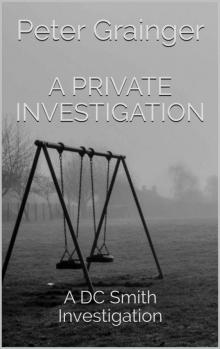 A Private Investigation
A Private Investigation Songbird
Songbird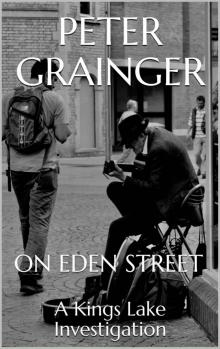 On Eden Street
On Eden Street An Accidental Death
An Accidental Death Time and Tide
Time and Tide An Accidental Death: A DC Smith Investigation
An Accidental Death: A DC Smith Investigation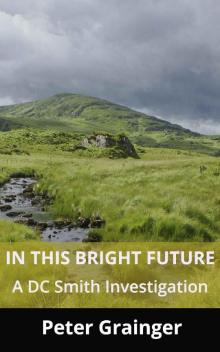 In This Bright Future
In This Bright Future Lane: A Case For Willows And Lane
Lane: A Case For Willows And Lane The Rags of Time: A DC Smith Investigation
The Rags of Time: A DC Smith Investigation Luck and Judgement
Luck and Judgement Persons of Interest: A DC Smith Investigation
Persons of Interest: A DC Smith Investigation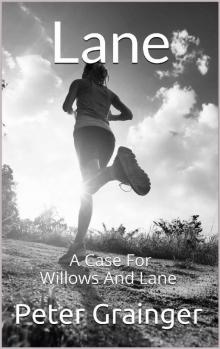 Lane
Lane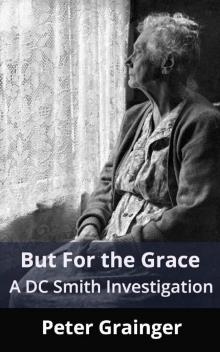 But For The Grace
But For The Grace Time and Tide: A DC Smith Investigation
Time and Tide: A DC Smith Investigation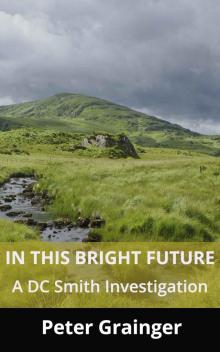 In This Bright Future: A DC Smith Investigation
In This Bright Future: A DC Smith Investigation The Rags of Time
The Rags of Time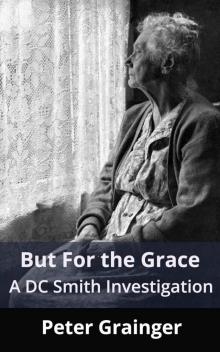 But For The Grace: A DC Smith Investigation
But For The Grace: A DC Smith Investigation Luck and Judgement: A DC Smith Investigation
Luck and Judgement: A DC Smith Investigation